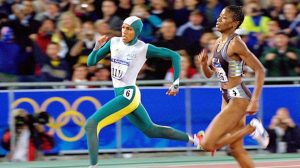I had trouble falling asleep the other night, so after more than an hour of tossing the pillows and comforter around, I turned on the TV and went channel-surfing. Nothing caught my attention until I came upon NBC Sports Network, which was airing Bud Greenspan’s documentary about the 2000 Olympics in Sydney, Australia.
I only caught the last half-hour, which focused on the finals in some track and field events, but it was incredibly compelling.
Although I knew the names of very few of the athletes, I was drawn into the drama of their attempts to win medals. Many of them were going for their first gold. Many were trying to win the only medal their nation had ever earned at the summer games. Some of them — like American sprinter Michael Johnson and Ethiopian long-distance runner Haile Gebrselassie — were perennial winners looking to extend their winning streaks. And it wasn’t just the men on the track. There was close competition between two women in the pole vault. There was a huge Eastern European guy hurling the discus a ridiculous distance. There was a female Australian runner trying to become the only person of aboriginal ancestry to finish first in an Olympic event.
What struck me most, however, was that Greenspan didn’t use audio of the TV announcers who had originally broadcast the games. Instead, he used Will Lyman, whose calm, steady voice you might know if you’ve ever watched “Frontline” on PBS. Lyman’s narration was matter-of-fact, without any of the hype we usually get from sportscasters who feel the need to heighten the drama by imposing their loquaciousness on us. Even better, Greenspan’s coverage was nation-agnostic, without the overt emphasis we usually see on Americans during NBC’s USA-centric coverage of the Olympics.
The whole thing had me thinking back to 1976, when my parents took me to the Summer Olympics in Montreal while my brother was at sleep-away camp. We couldn’t afford tickets to the finals of any events, but we went to see preliminaries of track and field, gymnastics, weightlifting, and bicycle racing. At none of those events did we know anything about the participants, but that didn’t reduce our enjoyment and appreciation of their efforts. I recall cheering for athletes whose countries I couldn’t identify on a globe.
That was my first Olympics experience. My second came in 1984, when I covered the Olympic torch relay as it moved through Hartford, Connecticut, where I was the morning man at WHCN.
My third came eight years later, when I took my morning radio show on WCXR/Washington to Albertville, France, for several days of live broadcasts during the 1992 Winter Olympics. I watched ski jumpers zooming down a terrifyingly steep hill before launching themselves into the air. I watched short-track skaters turn corners with their bodies oh-so-close to the ground. And I went to the skating venue to watch some of the most talented women on ice compete — including Tonya Harding and Nancy Kerrigan, two years before thug friends of the former took a pipe to the leg of the latter. I watched Kristi Yamaguchi sail through the air as if gravity had been suspended, and then had her on the phone the next day for a wonderful interview. I watched in amazement as the French skater Surya Bonaly did a full backflip, landing on her skates and continuing to glide along the ice to set up her next move.
It’s too bad we’ll have to wait until 2021 to have a new set of athletes trying to peak at just the right time to win medals of their own — preferably without the hype. Being able to experience those events without the distraction of over-caffeinated sportscasters makes them so much more enjoyable.

